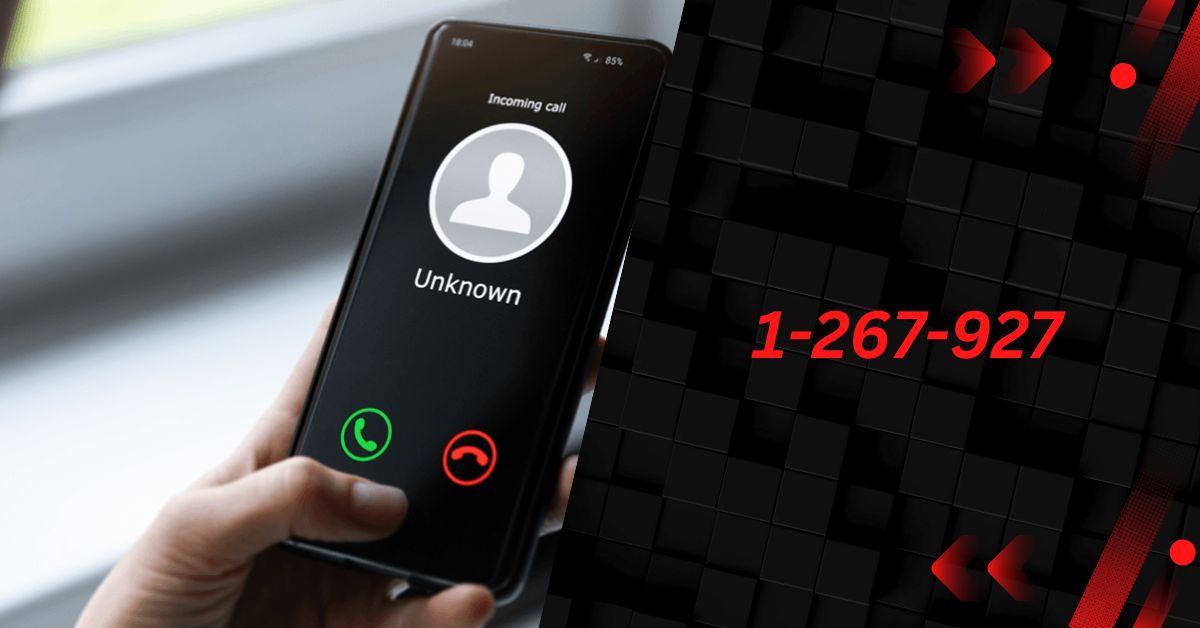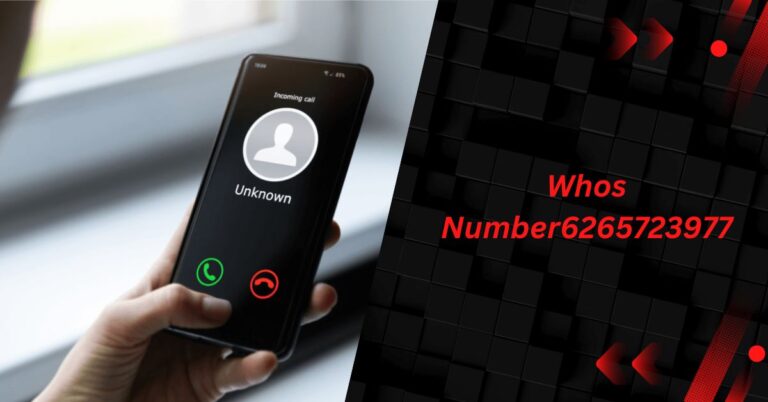The Risks and Realities of 1-267-927-3262: A Comprehensive Guide
In today’s digital age, the prevalence of scam calls has surged, becoming a pressing concern for many individuals in the United States. One such number that has caught the attention of the public is 1-267-927-3262.
This number has been reported frequently in association with fraudulent activities, leaving many to question its legitimacy. In this article, we will delve deep into the complexities of scam calls, particularly focusing on 1-267-927-3262, its implications, tactics used by scammers, and what individuals can do to protect themselves.
What is 1-267-927-3262?
The number 1-267-927-3262 is a phone number that has been linked to various scam attempts. Many reports indicate that individuals who answer calls from this number often encounter aggressive sales tactics or attempts to extract personal information. Understanding the nature of such calls is crucial in helping people navigate the treacherous waters of unsolicited communications.
The Rise of Scam Calls in the USA
Scam calls have become alarmingly prevalent across the United States. According to recent statistics, Americans receive billions of robocalls each year, with a significant portion attributed to scams. These calls can originate from both domestic and international sources, making it challenging for individuals to identify legitimate calls from fraudulent ones.
Why Are Scammers Targeting Your Phone?
The motivations behind these scam calls are simple: financial gain. Scammers utilize various strategies to manipulate victims into providing sensitive information, such as credit card details, Social Security numbers, and banking information. By leveraging technology and social engineering tactics, these fraudsters can create a façade of legitimacy that can deceive even the most cautious individuals.
Common Scams Associated with 1-267-927-3262
Impersonation Scams
One of the primary tactics employed by scammers calling from numbers like 1-267-927-3262 is impersonation. They may pose as representatives of legitimate organizations, such as the IRS, banks, or well-known companies. Their goal is to create a sense of urgency that compels the victim to act quickly without thinking.
How Impersonation Works
- Creating Urgency: Scammers often claim that there is a problem with your account or that you owe money. They may threaten legal action or arrest if you do not comply with their demands.
- Requesting Personal Information: Once the victim is in a state of panic, scammers ask for personal details under the guise of verifying your identity.
- Following Up: After obtaining some initial information, they may continue to follow up with additional calls, increasing the pressure on the victim.
Prize or Sweepstakes Scams
Another common strategy involves notifying individuals that they have won a prize or sweepstakes. The catch? They need to pay a fee or provide personal information to claim their winnings.
Characteristics of Prize Scams
- Too Good to Be True: If it sounds too good to be true, it probably is. Legitimate companies do not ask for payment to claim a prize.
- Pressure to Act Fast: Scammers often create a tight deadline for claiming the prize, further encouraging victims to act without thinking.
Tech Support Scams
Scammers also use numbers like 1-267-927-3262 to pose as tech support agents from well-known companies. They claim that there are issues with your computer and offer to fix them for a fee.
Common Features of Tech Support Scams
- Cold Calls: Scammers typically initiate contact without any prior relationship with the victim.
- Remote Access Requests: They may ask for remote access to your computer, which can lead to unauthorized access to your files and sensitive data.
Recognizing Red Flags
Understanding the red flags associated with scam calls is vital. Here are some common indicators that you might be dealing with a scam:
- Unknown Caller ID: If you receive a call from an unknown number like 1-267-927-3262, proceed with caution.
- Aggressive Tactics: Scammers often use high-pressure sales tactics. If you feel rushed, it’s a warning sign.
- Requests for Personal Information: Legitimate organizations will never ask for sensitive information over the phone.
- Inconsistent Information: If the caller provides details that seem inconsistent or vague, hang up.
What to Do If You Receive a Call from 1-267-927-3262
Step 1: Don’t Engage
If you receive a call from 1-267-927-3262, do not engage with the caller. Hang up immediately. Engaging can lead to further harassment.
Step 2: Report the Call
It is crucial to report any suspicious calls to authorities. You can report scam calls to:
- The Federal Trade Commission (FTC): You can file a complaint online at ftc.gov/complaint.
- The Federal Communications Commission (FCC): File a complaint at fcc.gov/complaints.
- Your Phone Provider: Many phone companies offer services to block or report scam calls.
Step 3: Block the Number
Use your phone’s blocking feature to prevent future calls from 1-267-927-3262. Most smartphones allow you to block specific numbers easily.
Step 4: Educate Yourself and Others
Awareness is one of the best defenses against scam calls. Share information about scams with family and friends to help them stay informed and vigilant.
Preventing Scam Calls: Tips and Tricks
Use Call Blocking Features
Most smartphones come with built-in call-blocking features. Familiarize yourself with these options to reduce the number of unwanted calls.
Register with the National Do Not Call Registry
You can register your phone number with the National Do Not Call Registry at donotcall.gov. While this won’t eliminate all scam calls, it can help reduce the number of legitimate telemarketing calls you receive.
Be Cautious with Personal Information
Be mindful of the information you share online. Scammers often gather data from social media profiles to make their calls seem more credible.
Utilize Call Screening Apps
Consider using call screening apps that can identify and block potential scam calls. Apps like Truecaller and Hiya provide additional protection against unwanted calls.
Understanding the Legal Landscape
What Are the Laws Against Scam Calls?
In the United States, various laws exist to protect consumers from unwanted and fraudulent calls. The Telephone Consumer Protection Act (TCPA) regulates telemarketing calls, robocalls, and automated messages. Understanding these laws can empower individuals to take action against scammers.
The Role of the FCC
The Federal Communications Commission (FCC) enforces regulations aimed at reducing unwanted calls. They encourage consumers to report illegal robocalls and scams.
The Psychological Impact of Scam Calls
Emotional Manipulation
Scammers often exploit emotions, such as fear and urgency, to manipulate victims. Understanding this psychological aspect can help individuals recognize and resist these tactics.
The Aftermath of Being Scammed
Victims of scams may experience a range of emotions, including shame, embarrassment, and anxiety. It’s essential for victims to seek support and understand that they are not alone.
FAQs about 1-267-927-3262 and Scam Calls
What should I do if I answered a call from 1-267-927-3262?
If you answered the call, do not provide any personal information. Hang up and report the number to the appropriate authorities.
How can I block scam calls on my phone?
Most smartphones have built-in features to block specific numbers. You can usually find this option in your call settings.
Are all calls from unknown numbers scams?
Not all calls from unknown numbers are scams, but it’s essential to be cautious. Always verify the caller’s identity before sharing any personal information.
Can I get my money back if I was scammed?
If you have lost money to a scam, report it immediately to your bank or credit card company. While recovery is not guaranteed, taking swift action can help mitigate losses.
How can I protect myself from scam calls in the future?
Educate yourself about common scam tactics, use call-blocking features, and be cautious about the information you share online.
Conclusion
As technology evolves, so do the tactics employed by scammers. The number 1-267-927-3262 serves as a reminder of the risks associated with unsolicited calls. By staying informed, recognizing red flags, and taking proactive measures, individuals can protect themselves from falling victim to scams. Awareness and education are your best defenses against the ever-evolving landscape of phone fraud.






